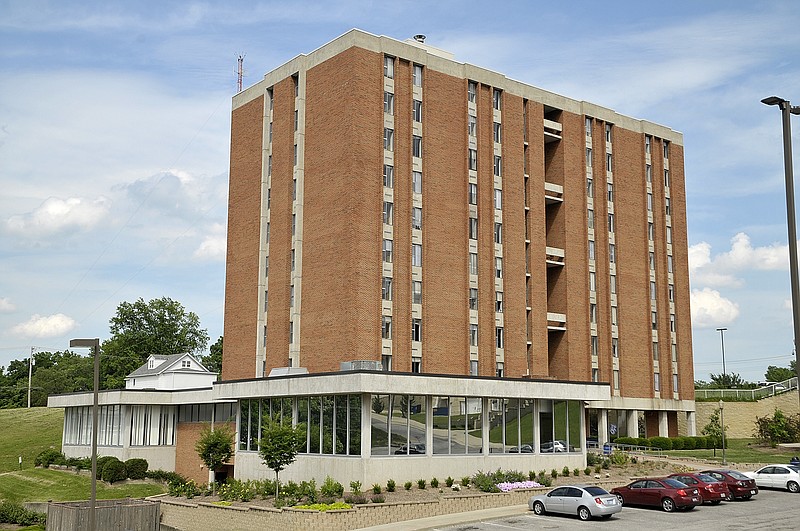Lincoln University is growing - and that growth means increasing pressures to find more rooms for students to live in.
Additionally, curators have been told at their last two meetings, Dawson Hall has a limited future for student housing but it - or at least the land it sits on - could become the centerpiece for the school's much-discussed (but not yet active) hospitality degree program.
"Tourism and hospitality is one of the largest, growing industries in the world," President Kevin Rome told the News Tribune after Thursday's Board of Curators meeting. "And, so as we prepare students for that field, they can work anywhere in the world."
Several years ago, then-President Carolyn Mahoney's administration proposed building a hotel on land LU owns south of Leslie Boulevard and connecting a hospitality degree program to that building.
More recently, during the Jefferson City Area Chamber of Commerce's Transformation discussions - and again about 18 months ago, as state and local officials looked at ways to use the now-vacant old St. Mary's Health Center - there were discussions about converting the hospital's kitchens into a lab for an LU hospitality degree program.
While those ideas haven't moved forward, the school isn't abandoning the concept.
Curators on Thursday heard a presentation from fellow-Curator Herb Hardwick of Kansas City, who is a lawyer specializing in real estate and property development, and from Allison Bergman, a partner in the Hardwick Law Firm with an 18-year career in hotels and college residence hall developments.
Bergman told the board her career has included two projects for the University of Missouri-Kansas City - one where she represented the university, and the other on the side of a developer who wanted to work with UMKC.
"I understand both sides of the equation," she said. "I have the experience of representing both parties in the transaction, so I understand some of the nuances that are important to each representation and how they approach the project."
Lincoln opened the Sherman Scruggs Residence Hall, 800 Locust St., in 2008 as the newest site for student housing.
Also, they're talking about a need for more residence hall rooms.
"Our housing is old," Rome said. "It's lived beyond its usefulness as far as accommodating students - and we're aware of that.
"If we're going to house students, we're going to have to have better facilities for them."
While students in previous generations may have settled for getting rooms in older dormitory buildings, Rome said, today's constant technological advances have made those older buildings more difficult to work with.
"And it's also a sort of competition" with other colleges and universities, "because students look at facilities," Rome explained. "I know that several of the institutions around us are building new housing or remodeling housing - and when students see that and then they see our housing, there's no comparison.
"And we want to be competitive with these other institutions. And we want our students to have appropriate accommodations that they're living in."
As they discuss the housing needs, Bergman told the board they could consider a "multi-phase project, the first phase being the construction of new student housing, and the second phase being - with the proceeds from the student housing - to move on to the Dawson Hall site, or using the Dawson Hall Building to create a conference center and hotel."
Hardwick added, "With respect to Dawson, the thought would be that we would take those rooms and convert them to hotel-like rooms, and use that entire facility for that purpose."
Or, Rome reminded the curators, they could "demolish and rebuild (Dawson), as an option."
In an interview, Rome explained, Dawson Hall is "just inadequate as we move forward. The mechanical infrastructure is outdated, and we're having to invest too many resources to maintain it.
"It's just not worth it, after a certain point."
Even to re-purpose it as a hotel would require extensive renovation - but that cost might be borne by an outside developer.
"In a hotel, you want to have some type of bathroom in each room - in the current configuration of Dawson, there is no bathroom in each room," Rome said. "So, there would definitely be some changes that would be required.
"I'm sure there's some requirements for soundproofing in rooms when you have a hotel. And there are certain standards that are required by chain hotels."
As with the original idea nearly a decade ago, having a national chain operate the hotel is a part of the deal many would like to see.
Bergman on Thursday often referred to a chain hotel as a "flag."
"Going to adaptive re-use or demolition (of Dawson), a flag may have something to say about that," she reminded the curators.
"If you think in terms of a private developer, they're going to want site control, so they know that they can get the private financing to move forward on a project - so that may require some dialog with the state" because it's state-owned land.
Over the years, LU officials have said having a national chain operate the hotel would let them use their expertise, while allowing interested LU students to learn the trade and get a degree that could benefit everybody.
Rome emphasized Thursday that no decisions have been made yet - it's still just a discussion.
When the time comes, he told the curators, there would be a formal request for proposals to see what kinds of companies might be interested.

